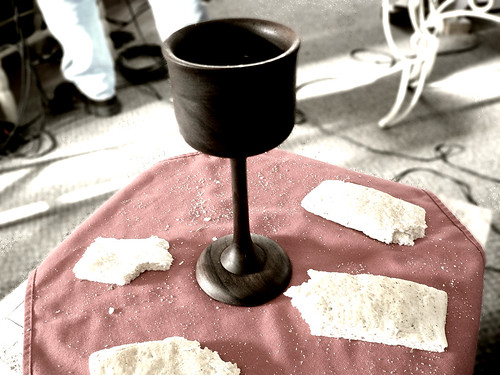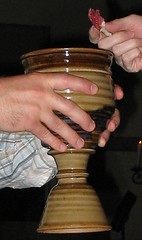(Note: Catechises is Christian instruction in doctrine and morality, usually through a set of questions and answers known as a catechism.)
THe Countrey Parson values Catechizing highly: for there being three points of his duty, the one, to infuse a competent knowledge of salvation in every one of his Flock; the other, to multiply, and build up this knowledge to a spirituall Temple; the third, to inflame this knowledge, to presse, and drive it to practice, turning it to reformation of life, by pithy and lively exhortations; Catechizing is the first point, and but by Catechizing, the other cannot be attained. Besides, whereas in Sermons there is a kinde of state, in Catechizing there is an humblenesse very sutable to Christian regeneration, which exceedingly delights him as by way of exercise upon himself, and by way of preaching to himself, for the advancing of his own mortification; for in preaching to others, he forgets not himself, but is first a sermon to himself, and then to others; growing with the growth of his Parish. He useth, and preferreth the ordinary Church-Catechism, partly for obedience to Authority, partly for uniformity sake, that the same common truths may be every where professed, especially since many remove from Parish to Parish, who like Christian Souldiers are to give the word, and to satisfie the Congregation by their Catholick answers. He exacts of all the Doctrine of the Catechisme; of the younger sort, the very words; of the elder, the substance. Those he Catechizeth publickly, these privately, giving age honour, according to the Apostles rule, I Tim. 5. I. He requires all to be present at Catechizing: First, for the authority of the work; Secondly, that Parents, and Masters, as they hear the answers prove, may when they come home, either commend or reprove, either reward or punish. Thirdly, that thoseof the elder sort, who are not well grounded, may then by an honourable way take occasion to be better instructed. Fourthly, that those who are well grown in the knowledg of Religion, may examine their grounds, renew their vowes, and by occasion of both, inlarge their meditations. When once all have learned the words of the Catechisme, he thinks it the most usefull way that a Pastor can take, to go over the same, but in other words: for many say the Catechisme by rote, as parrats, without ever piercing into the sense of it. In this course the order of the Catechisme would be kept, but the rest varyed: as thus, in the Creed: How came this world to be as it is? Was it made, or came it by chance? Who made it? Did you see God make it? Then are there some things to be beleeved that are not seen? Is this the nature of beliefe? Is not Christianity full of such things, as are not to be seen, but beleeved? You said, God made the world; Who is God? And so forward, requiring answers to all these, and helping and cherishing the Answerer, by making the Question very plaine with comparisons, and making much even of a word of truth from him. This order being used to one, would be a little varyed to another. And this is an admirable way of teaching, wherein the Catechized will at length finde delight, and by which the Catechizer, if he once get the skill of it, will draw out of ignorant and silly souls, even the dark and deep points of Religion. Socrates did thus in Philosophy, who held that the seeds of all truths lay in every body, and accordingly by questions well ordered he found Philosophy in silly Trades-men. That position will not hold in Christianity, because it contains things above nature: but after that the Catechisme is once learn’d, that which nature is towards Philosophy, the Catechism is towards Divinity. To this purpose, some dialogues in Plato were worth the reading, where the singular dexterity of Socrates in this kind may be observed, and imitated. Yet the skill consists but in these three points: First, an aim and mark of the whole discourse, whither to drive the Answerer, which the Questionist must have in his mind before any question be propounded, upon which and to which the questions are to be chained. Secondly, a most plain and easie framing the question, even containing in vertue the answer also, especially to the more ignorant. Thirdly, when the answerer sticks, an illustrating the thing by something else, which he knows, making what hee knows to serve him in that which he knows not: As, when the Parson once demanded after other questions about mans misery; since man is so miserable, what is to be done? And the answerer could not tell; He asked him again, what he would do, if he were in a ditch? This familiar illustration made the answer so plaine, that he was even ashamed of his ignorance; for he could not but say, he would hast out of it as fast as he could. Then he proceeded to ask, whether he could get out of the ditch alone, or whether he needed a helper, and who was that helper. This is the skill, and doubtlesse the Holy Scripture intends thus much, when it condescends to the naming of a plough, a hatchet, a bushell, leaven, boyes piping and dancing; shewing that things of ordinary use are not only to serve in the way of drudgery, but to be washed and cleansed, and serve for lights even of Heavenly Truths. This is the Practice which the Parson so much commends to all his fellow-labourers; the secret of whose good consists in this, that at Sermons, and Prayers, men may sleep or wander; but when one is asked a question, he must discover what he is. This practice exceeds even Semons in teaching: but there being two things in Sermons, the one Informing, the other Inflaming; as Sermons come short of questions in the one, so they farre exceed them in the other. For questions cannot inflame or ravish, that must be done by a set, and laboured, and continued speech.

This is possibly the most succinct theory of Christian Education I’ve ever seen. In this Herbert makes the distinction between preaching and teaching (noting that teaching is better suited to instruct but preaching more for inspiring) and gives three goals for Christian education: 1. to lead to saving faith, 2. to give spiritual growth to believers and 3. to bring Biblical knowledge in to active life. I think anyone who believes that past education was simply memorizing and responding by rote should read this, where Herbert himself recognizes that simple ‘parrating’ isn’t sufficient.
However, note that simple memorization is seen as a beginning point, which classical educational philosophy recognizes. We have to start with some content and we gain this by basic grasping of vocabulary. Herbert offers advice how to move this basic grasp into deeper knowledge: vary the order and the questions so that the catechumen has to actually think and then lead deeper by making analogies. (It seems we have turned common sense on its head by asking beginners to “express themselves” before they gain a basic knowledge of content to understand it or even a solid vocabulary with which to do so.
(Image is : Plimoth Plantation father and son by romulusnr)







